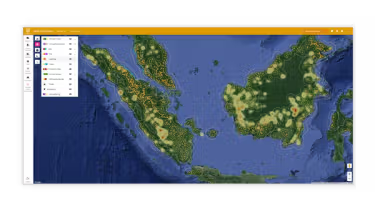SDG 16, “Peace, Justice and Strong Institution” focuses on fostering transparent governance, ethical business practices, and inclusive systems to build peaceful and just societies. In Malaysia’s and Indonesia’s palm oil sector, where challenges such as deforestation, land disputes, and labour rights violations persist, aligning with SDG 16 is essential for long-term sustainability. Businesses play a crucial role in addressing these issues through responsible sourcing, labour standards enforcement, and supply chain transparency.
However, achieving SDG 16 requires overcoming significant obstacles. A lack of traceability increases the risk of unethical practices, worker exploitation threatens social equity, and land conflicts create instability within communities. Without robust governance and corporate responsibility, these challenges continue to undermine sustainable development.
Unilever, a global leader in consumer goods, has taken a proactive approach to tackling these issues in Malaysia’s and Indonesia’s palm oil sector. Through innovative technologies, stakeholder collaboration, and sustainable policies, the company has transformed its supply chain, setting a benchmark for responsible business practices. This case study explores how Unilever is driving change, ensuring that economic growth, social justice, and environmental preservation go hand in hand.


Sustainable Business Strategies for SDG 16
Businesses play a vital role in promoting peace, justice, and strong institutions. Here are five key strategies aligned with SDG 16:
- Transparent Governance: Implement blockchain and satellite monitoring to ensure supply chain traceability, prevent corruption, and uphold ethical business practices.
- Fair Justice Systems: Engage with governments, NGOs, and communities to resolve land disputes, protect workers’ rights, and foster trust in supply chains.
- Ethical Supply Chains: Enforce strict labour policies, conduct regular audits, and partner with certified sustainable suppliers to ensure fair treatment and compliance.
- Inclusive Economic Growth: Support smallholder farmers and marginalised communities through training programmes, fair wages, and access to sustainable resources.
- Policy Advocacy: Collaborate with policymakers to push for regulations that promote responsible business practices, transparency, and environmental sustainability.
Case Study: Unilever’s Commitment to Sustainable Palm Oil in Malaysia and Indonesia
Background
Unilever, a global leader in consumer goods, has long been at the forefront of ethical and sustainable business practices. With palm oil production linked to significant environmental and social challenges, including deforestation, land disputes, and human rights violations, Unilever has redefined its approach to sourcing palm oil in Malaysia and in Indonesia.
Challenges
Palm oil production, while vital to global economies, has created serious challenges:
- Deforestation: Expanding plantations often result in the destruction of critical habitats, threatening biodiversity and accelerating climate change. Check out Malaysia’s and Indonesia’s deforestation rate here.
- Human Rights Violations: Workers on palm oil plantations are frequently subjected to exploitative labor practices, and land disputes are common.
- Lack of Transparency: With complex and opaque supply chains, tracing the origin of palm oil and ensuring ethical sourcing can be a daunting task.
Solutions and Implementation
To tackle these issues head-on, Unilever implemented a comprehensive, multi-pronged approach that focuses on transparency, collaboration, and innovation. Here’s how they’re driving change:
- Leveraging Technology for Full Traceability
Unilever uses satellite monitoring to track deforestation in real time. Additionally, blockchain technology enables end-to-end traceability, providing transparent records from Malaysian and Indonesian plantations to the final consumer products. This ensures compliance with environmental and ethical standards, promoting full accountability in the palm oil supply chain.

Source: https://www.unilever.com/sustainability/nature/deforestation-free-supply-chain/palm-oil-story/
- Ensuring Supplier Accountability
Unilever works closely with palm oil suppliers in Malaysia and Indonesia, enforcing strict policies on sustainable land management and ethical labour practices. The company conducts regular audits and collaborates solely with suppliers who adhere to these rigorous standards. Non-compliant suppliers are removed, creating space for certified sustainable producers. This approach reinforces ethical practices within the palm oil sector.
- Empowering Smallholder Farmers
Smallholder farmers in Malaysia and Indonesia, who play a significant role in palm oil production, often lack the resources to implement sustainable farming practices. Unilever’s collaboration with local NGOs addresses this gap by offering training programmes focused on sustainable agriculture techniques, such as water conservation and agroforestry. These initiatives enhance productivity while minimising environmental impact, benefiting over 21,000 farmers to date.

Source: https://www.unilever.com/sustainability/nature/deforestation-free-supply-chain/palm-oil-story/
- Collaborative Industry Initiatives Unilever actively supports the Roundtable on Sustainable Palm Oil (RSPO) and Malaysian Sustainable Palm Oil (MSPO) certification program, ensuring that its palm oil meets national sustainability standards. By working closely with local governments, NGOs, and industry stakeholders, Unilever fosters collaboration that resolves land disputes and promotes fair resource distribution, helping to create a more sustainable and equitable palm oil sector in Malaysia.
Impacts
Unilever’s efforts in Malaysia have yielded impressive results, including:
- Increased Supply Chain Transparency: With satellite monitoring and blockchain traceability, the majority of Unilever’s palm oil supply in Malaysia and Indonesia is now certified sustainable.
- Environmental Conservation: Targeted interventions based on deforestation monitoring have helped protect vital ecosystems in regions like Sabah and Sarawak.
- Smallholder Empowerment: More than 21,000 smallholder farmers have gained access to training, improving their productivity and market access while reducing environmental impact.
- Promoting Peace and Justice: Unilever’s collaborative approach has helped resolve multiple land disputes, fostering trust between local communities and industry stakeholders.
Conclusion
Unilever’s work in Malaysia offers key lessons for businesses integrating ethical and sustainable practices. Harnessing technology through satellite monitoring and blockchain enhances transparency and ensures compliance, while collaboration with governments, NGOs, and communities strengthens sustainability initiatives. Supporting smallholders drives both environmental and economic growth, fostering a more resilient palm oil sector. By prioritizing transparency, ethical sourcing, and stakeholder engagement, Unilever exemplifies how businesses can align with SDG 16 to drive systemic change. This case study highlights a replicable model for ensuring economic growth, social justice, and environmental preservation in the palm oil industry.
BBC comprises a team of passionate practitioners dedicated to implementing sustainability solutions. Our engineers and consultants bring extensive expertise in ESG, sustainability, and sustainable plantation management, helping you overcome challenges in developing a robust and innovative plantation management system.
Read more about Sustainable Plantation Management
References:
Goal 16 | Department of Economic and Social Affairs. (n.d.). Retrieved from https://sdgs.un.org/goals/goal16
Unilever (2025) Retrieved from Available at: https://www.unilever.com/sustainability/nature/deforestation-free-supply-chain/palm-oil-story/

